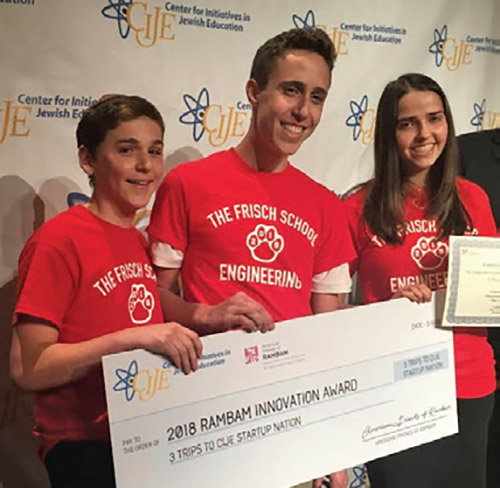










This year’s CIJE-Tech Innovation Day took place on May 7 at the New York Hilton and featured some 400 engineering capstone projects of 1300 students from 32 different yeshiva day schools, the culmination of the CIJE-Tech High School Program. This year included the addition of the Rambam Innovation Award, a joint initiative of CIJE and American Friends of Rambam Medical Center, which was judged separately by a panel of engineers from Haifa’s Rambam Medical Center—a leader in the field of emergency response. The competition challenged students to create a project that would “correlate to Rambam’s work in preparation and response to disasters, whether natural or man-made, as well as mass-casualty situations.”
In advance of Sunday’s Innovation Conference, Jason Cury, president of CIJE, said,� “This event will bring together top students to present their unique and innovative capstone projects as part of their preparation for 21st-century careers.” The incredible creativity, skill and ingenuity shown by so many students at this event certainly makes the future look very bright
Frisch won first place overall, with two individual Frisch sophomore teams also taking home the first and second place prizes for the 2018 Rambam Innovation Award.
Frisch’s first place submission, “Illuminate + Evacuate” (by Zachary Gold, Manny Nagel and Caroline Waxman), engineered an escape route system that could be used in the evacuation of large buildings. The system develops the safest route out of the building and illuminates that exit path via LED lighting.
Frisch’s second place submission, “The Key to Safety” (by Shifra Dimbert, Rachel Gelb and Ayelet Glaser), coded an automatic attendance recording system that uses chip technology on student ID cards to record the location of every student within a school building, designed to reduce chaos in cases of emergency.
With 166 students and 53 project entries, the Frisch engineering team was the largest contingent at CIJE Innovation Day. Engineering Program Director Rifkie Silverman brings all freshmen and sophomores to the event, saying, “Each group deserves the opportunity to pitch their project and evaluate other projects, and learn from the experience.” The school’s new Fab Lab/MakerSpace, made possible in part by a grant from CIJE, contributed significantly to the students’ projects.
Students in Frisch’s engineering track learn fundamentals and gain project-based experience in their freshman and sophomore years, and they have the option of multiple electives during their junior and senior years. Sophomore Ilana Knoll said, “My favorite part of the engineering track is the sense of independence.” Frisch will hold its annual Engineering and Science Symposium on Wednesday, May 23, at 7 p.m.
Bruriah sent 21 students to the conference, presenting seven projects, and took first place among schools with fewer than 15 projects at the competition for the second year in a row. One invention that was chosen as a finalist for the CIJE Tank competition was “Bedsore Begone” (by Hallie Gordon, Judith Wechter and Nechama Stein), aimed at helping decrease deaths due to bedsores with a device that uses sensors and an algorithm to inform hospital and nursing home staff when a patient’s body needs to be moved or rotated.
Ma’ayanot’s STEAM team presented 29 innovative projects and earned second place overall, proudly adding their trophy to last year’s first place win. STEAM teacher Gillian Cofnas said, “We’re so proud of our students’ hard work and creativity. Their inventions are amazing and they articulated their presentations to the judges and visitors with true expertise.”
One Ma’ayanot entry (by Tamar Pasternak and Allie Orlinsky) was called “Shopper Shelves.” It alerts a homeowner when pantry shelves are empty and sends a message, such as “You’re out of Cheerios.” Another invention, called “Interactive Art Therapy” (by Elisheva Herzig, Kayla Waizer and Tamar Berman), presents the viewer with a painting of an ocean scene with interactive elements.
Rae Kushner Yeshiva High School seniors Emily Gruber and Jonah Braverman took home the first place team award for the 2018 Innovation in Healthcare with their “AED On the Go,” an ultra portable and cost-effective pocket-sized defibrillator to treat sudden cardiac arrest.
Additional examples of RKYHS capstone projects included FeedBot, an automated device to help feed people who can’t feed themselves; PillClock, a personalized, automatic pill reminder; Glucosalyzer, a glucose detector utilizing saliva instead of a finger prick; LoNess, a date rape drug detector; ThermoCharge, a thermoelectric generator that converts heat from the phone into electricity to charge the phone and more.
The RKYHS STEM program includes numerous STEM-related course offerings spanning all high school grades. The RKYHS STEM approach focuses on problem solving and critical thinking, encouraging innovation and invention.
Following the presentation of the awards, Judy Lebovits, CIJE vice president, expressed her pride in what each of the students had presented as a culmination of their CIJE-Tech course. “These students have become problem solvers, creative thinkers, innovators and self-reliant. They are the future!”
By JLNJ Staff













